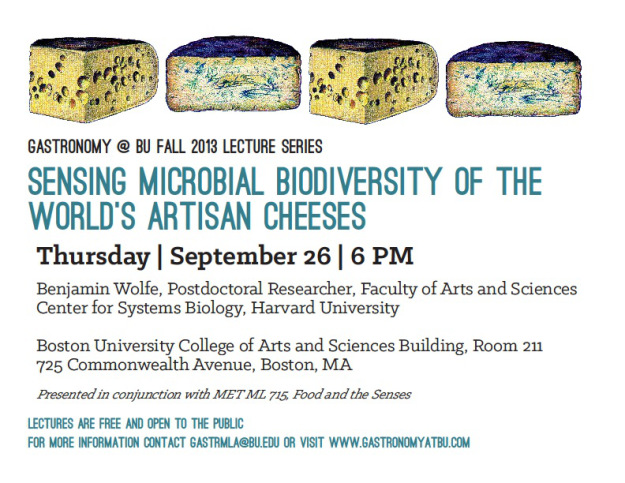Fall Lecture Series Recap: Sensing Microbial Diversity of the World’s Artisan Cheeses
Throughout the year, the BU Gastronomy blog will feature occasional posts from special guest writers including current students, recent alumni, professors, and more. The following Guest Post is brought to you by Gastronomy student Lauren Kouffman with photographs provided by fellow Gastronomy student Chris Maggiolo.

Boston University’s Gastronomy Program presented a lecture on Thursday September 26th, entitled, “Fall Lecture Series: Sensing Microbial Diversity of the World’s Artisan Cheeses,” in conjunction with MET ML701 (Food and The Senses), a core Gastronomy course which focuses on the physical and sensory aspects of experiencing foodways. Benjamin Wolfe, a Postdoctoral Researcher from Harvard University, presented his research to a mix of Gastronomy-matriculating students and members of the public, and later invited everyone to partake in the sensory experience themselves, with tastes of three very distinct cheeses.

via Benjamin Wolfe
Dr. Wolfe specializes in studying microbes: tiny organic particles that grow, and eventually group together into what is known as a colony, in the process of breaking down food matter. Essentially, Dr. Wolfe described, microbes are the force behind rot- but this is not always a bad thing. His current research has led him to an in-depth exploration of the microbial factors that influence the expression of various texture, smell, and taste traits of some of the most well-known artisanal cheeses, each one developed through years of precise microbial manipulation and traditional methodology.
via Chris Maggiolo
Interestingly, Wolfe and his Harvard research team have recently been at the helm of a new movement to identify and propagate uniquely North American microcultures in artisanal cheesemaking, rather than relying on imported European-native cultures or American-manufactured reproductions of the more traditional strains. The project itself might even be compared to larger national initiatives to re-popularize certain Heritage breeds of crops and livestock, based on an altruistic approach that simultaneously is concerned with preserving unique regional flavors (that is, the basis of terroir itself), and restoring diversity to the American culinary landscape. A new laboratory at Jasper Hill Farms, a Vermont dairy farm and artisanal cheese producer, has even been subsidized by the United States government for the continuation of Dr. Wolfe’s research. Evidently, the identification and taxonomy of uniquely-American microbial terroir is worth the trouble.

via Benjamin Wolfe
While identifying the individual cultures that already exist on any one style of cheese is a logical, if time-consuming, macro-approach, Dr. Wolfe explained he often takes a reverse-engineering approach to his work, attempting instead to isolate and identify each specific culture by tinkering with the conditions (quantities and varieties of salt, for example, or even the type of grass that is fed to the animals producing the milk) that might cause any particular strain to thrive.
via Chris Maggiolo
At the end of his intriguing talk, Dr. Wolfe opened the floor for questions. While he touched upon the subject briefly I was particularly interested in learning more about the influence of the DuPont-owned industrial reproduction of European-native cultures, and whether or not Dr. Wolfe’s team anticipates being at odds with the economic or political motivations of a huge corporation like DuPont. Is there the potential for a Monsanto-esque backlash in the future? Dr. Wolfe explained that since he is not actually modifying genetic material, and there’s no possible way to copyright the microbes he is studying since they appear naturally in the world, there is little threat of resistance from DuPont at this time. Still, the idea that a larger corporation might take umbrage at independent and public research isn’t out of the realm of possibility, and I am certainly interested to see how long the government will continue to subsidize this project, worthy as it may be.
via Chris Maggiolo
Dr. Wolfe’s work is equally fascinating for members of the science community, food-activists, or the average cheese-lover, and his engaging talk certainly left me hungry for more. For more information on Dr. Wolfe’s work with Jasper Hill Farms, along with his other incredible research projects, visit his website at www.benjaminewolfe.com/.
Benjamin Wolfe will be teaching a class in the Microbiology of Food during the Spring 2014 Semester. This class will meet on Wednesday evenings from 6 to 9 PM.
Are you a current student or a recent alum with a food-filled story to share? Pitch your idea to gastronomyatbu@gmail.com and get published on the BU Gastronomy blog!


